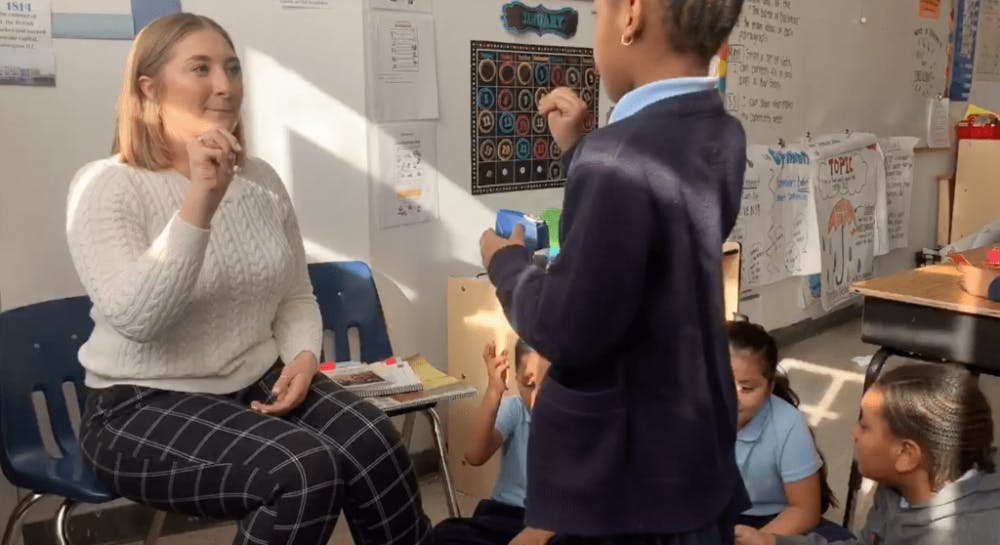By Jamie Pillion
Correspondent
Many of Karlie Lombardi’s students don’t have access to technology at home. Just when she felt like her third graders were starting to love learning, the dynamic of teaching across America changed in the blink of an eye.
Instead of face-to-face lessons, dynamic activities and individualized learning, she and her colleagues have been forced to assign take-home readings, packets of math problems and “do it yourself” science experiments.

But finding a way to explain these assignments has become virtually impossible.
“We sent out an email to the parents to come pick up work packets for their kids, but I think only a few of them even received that message,” said the senior childhood education and psychology dual major. “We had no warning to give the students that we were closing, so I’m sure they were just as surprised as we were. I’ve had no communication with my students and may not be able to ever see them again. It is heartbreaking.”
As students around the country begin online classes, education majors at the College have been tasked with an unfamiliar feat — How do you effectively teach students as young as age 6 from behind a computer screen, or with no communication at all?
On March 12, Dean of Education Suzzane McCotter notified all education students that they would not be returning to their classroom placements. This has left many student teachers, who were on track to graduate this semester, unable to complete the tests and certifications that they need to become educators.
One of the many concerns for student teachers throughout this pandemic is passing the edTPA, which consists of submitting unedited video recordings of themselves working in a real classroom.
“With this graduating class being the first required to complete and pass edTPA, I was not able to complete my planning and recording prior to the closure of schools,” said Marissa Willox, a senior elementary education and mathematics dual major. “Because of this, I am put at the huge disadvantage, as well as many of my colleagues, in that, if schools do not return prior to the conclusion of the semester, I will not receive the certification I was anticipating. This is beyond disheartening, considering all the work I have put in up to this point.”
Willox, who was placed in a fifth grade classroom in the South Brunswick School District, is one of the many student teachers who are concerned about completing their certifications in the wake of COVID-19.
Although Willox can no longer see her students in person, she is still involved with daily instruction and planning. This consists of virtual morning meetings, providing feedback via Google Classroom and meeting with students online to discuss any challenges they are facing, she said.
In her email, McCotter offered student teachers some words of encouragement.
“In my own teacher preparation, student teaching was an incredibly powerful experience,” she wrote. “I am deeply sorry that for some of you this experience will be shortened. The good news is that you have many years of important work with children, colleagues, and schools ahead of you. With luck, this will be a short interruption, and we will be back to normal before long.”
Elementary school teachers are especially challenged by the loss of face-to-face interaction, especially when they cannot even lead online instruction.
“I feel like I was just getting somewhere with my kids and finally getting them to start to love to learn, and I’ve lost all of that momentum,” Lombardi said.
Emme McGilligan (’19) teaches second graders in the Bronx district through Teach for America. As a teacher in a low income community, McGilligan is also struggling to find ways to work with her students and their families remotely.

“A lot of families don’t have the technology needed to access school from home, so providing Chromebooks and laptops to every family who needed it was the first step,” said McGilligan. “99% of our scholars qualify for free breakfast and lunch, so our amazing cafeteria and kitchen staff made meals and stay at the school to give them out.”
Despite the challenges that educators are facing, they are determined to maintain a positive outlook and work through these obstacles together.
“I’m really lucky, because my school has a strong culture of community and everyone leans on one another,” said McGilligan. “So despite how difficult and weird this whole thing is, it’s been really beautiful seeing people come together.”







